520 Search Results for year of core words
April 16, 2020
by Carole Zangari -

The other day, a friend posted something on social media that many of us can relate to. “Between all the hand sanitizer and cleaning solution that my skin absorbs,” she said, “I’m probably disinfecting the toilet with every trip to the bathroom!” While that’s a bit of a stretch, it is true that most of us are washing our hands more often now than ever before. And for good reason. But some of our AAC learners don’t really like hand washing and it can be a struggle to have them do that several times a day. In today’s post, we share some ideas that can help keep those hands clean. Not everyone will need every strategy, but we included several ideas so that you can select those that are most beneficial for the AAC learners in your life. Teach the skill and use a visual schedule to illustrate the steps.... [Read More...]
April 6, 2020
by Carole Zangari -
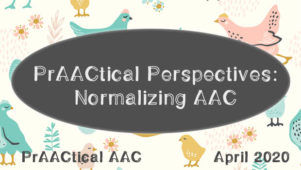
How do we help people with complex communication needs become fluent in using AAC throughout the day? There are lots of factors to consider in working toward that goal, and our guest author for today encourages us to think of one of them. Special educator Amy Campbell believes that one thing we can do to support AAC learners is to normalize the use of AAC tools and strategies. Amy is the 2020 Washington State Teacher of the Year and has been a Special Education teacher for 12 years. Over that time, she has focused on how to increase student independence and improve the inclusion of students with disabilities into general education settings and the greater community. Like many of you, she has now pivoted to supporting her students from a distance. Don’t miss the videos Amy creates for her students and their families so learning can continue from afar. ... [Read More...]
February 17, 2020
by Carole Zangari -
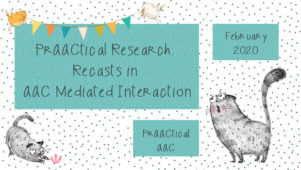
Today, we welcome back guest author Dr. Kathy Howery for another wonderful discussion of an important AAC research article. Dr. Howery’s work in AT and special education spans three decades and her research uses phenomenological methods to increase our understanding of the lived experience of people who use AAC. She works with the Ministry of Education low incidence team, and as a consultant to schools and school districts across Alberta focusing primarily on children and youth with complex communication needs. In this post, Dr. Howery reviews an important article describing research on recasting in AAC mediated conversations. Recasts in AAC Mediated Interaction Soto, G., Clarke, M. T., Nelson, K., Starowicz, R., & Savaldi-Harussi, G. (2020). Recast type, repair, and acquisition in AAC mediated interaction. Journal of Child Language, 47, 250-264. https://doi.org/10.1017/S03035000919000436 What this article is about (the focus of the research)? This article focuses its attention on the power of... [Read More...]
February 13, 2020
by Carole Zangari -
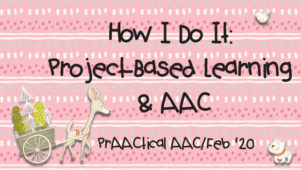
Looking for ways to promote inclusive practices in your school? Today, AAC SLP and AT Consultant Sarah Gregory returns to share more about the strategies and approaches she uses in the peer support program in her school district in Ithaca, NY. Learn about how she implements problem-based learning to promote authentic learning experiences and meaningful connections between students with and without disabilities. You can see Sarah’s previous post on peer modeling here. Project-Based Learning and AAC I discussed in my first blog post the importance of authentic inclusion of students with Complex Communication Needs in the general education classroom. Involving peers in using AAC has been a great tool to move to a model of true inclusion. When incorporating peer support into a classroom structure I am thoughtful to make the interaction authentic and meaningful for everyone involved. Since starting a peer support program two years ago I have continuously... [Read More...]
December 30, 2019
by Carole Zangari -

As we prepare to greet a new year and enter a new decade, let’s revisit some of the most popular posts of 2019. How I Do It: Writing IEP Goals for Students Who Use AAC with Lauren Enders PrAACtical AAC Goals Core Samples How I Do It: Using PODD books and Aided Language Displays with Young Learners with Autism Spectrum Disorder AAC Assessment Forms Teaching Core Vocabulary Literacy for Everyone with Adapted Books A Year of Core Vocabulary Words AAC Vocabulary Lists Make It Monday: Manual Communication Boards with Core Vocabulary Communication Boards: Colorful Considerations Do you have a favorite that didn’t make the list? We’d love to hear about it.
December 16, 2019
by Carole Zangari -
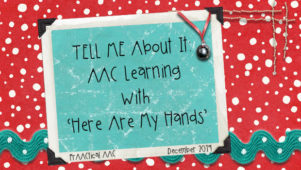
Welcome to a new edition of TELL ME About It, with AAC Specialists Maggie Judson and Jeanna Antrip. Maggie and Jeanna are speech-language pathologists who work in the Assistive Technology Department for the Belleville Area Special Services Cooperative (BASSC) in southern Illinois. They are AT/AAC facilitators and provide evaluations, direct therapy, consultations, and trainings. They’ve collaborated on a series to share their experiences in supporting preschool classrooms that implement the TELL ME program that Lori Wise and I created. If you missed the earlier posts in this series, you can get caught up using the links below. From Head to Toe I Went Walking Brown Bear, Brown Bear TELL ME AAC Literacy Kits TELL ME About It: AAC Learning with ‘Here Are My Hands’! TELL ME About Reading: The fourth book in the TELL ME program (Teaching Early Language and Literacy through Multimodal Expression) is “Here Are My Hands.” A... [Read More...]
November 25, 2019
by Carole Zangari -

When we first started writing about core vocabulary, it was partly because most of the AAC systems we came across in our clinical work were heavy on nouns and/or prestored messages. Now that core vocabulary plays a more central role in so many AAC systems, it’s important that we not lose sight of the important role that fringe vocabulary plays for the vast majority of people with AAC needs. In today’s post, guest author Susan Todd, a doctorate student focusing on AAC at the University of Kansas, shares thoughts and strategies for selecting fringe words. An SLP, Susan practiced for four years in outpatient setting completing AAC evaluations and implementing AAC interventions. Susan is also the author and creator of AACtualTalk, a blog aimed at providing advocacy and education in the area of AAC. :::::::::::::::::::::::::::::::::::::::::::::::::::::::::::::::::::::::::::::::::::::::::::::::::::::::::: Fringe Vocabulary: How to Select and Not Neglect Core vocabulary gets a lot of attention... [Read More...]
November 21, 2019
by Carole Zangari -
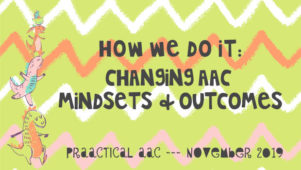
As AAC interventionists, we spend a lot of time helping therapists, teachers, families, and others develop their appreciation for multimodal communication and build their skills in using supportive strategies. In today’s post, Deidre Dobbels, a speech-language pathologist specializing in AAC, language and literacy development in young children, shares her thoughts on how we can do this effectively. Deidre is employed by Barrington CUSD #220 in the Northwest Suburbs of Chicago in which a Universal Core Approach to Language and Literacy has been in place for nearly a decade. Deidre authored a multi-media early developing core vocabulary curriculum used by her school district as well as by therapists and teachers throughout the Midwest. In her guest post, Deidre talks about her experiences in addressing the AAC needs of young children with complex communication needs. Changing Mindsets, Changing Outcomes As a young Speech Language Pathologist working in Early Childhood classrooms, I was... [Read More...]
October 24, 2019
by Carole Zangari -

As we all know, parents of kids with complex communication needs play a critical role in their children’s learning of communication, language, and AAC. Today, our guest authors describe an important study that can help us support these families with effective training, practice, and coaching. Jill Senner, Kathy Post, and Matthew Baud describe the study they did on AAC parent training and explain the outcomes. Enjoy! :::::::::::::::::::::::::::::::::::::::::::::::::::::::::::::::::::::::::::::::::::::: In 2018, we wrote about the importance of evidence-based practice in ensuring a high standard of care for our clients and patients. Reading AAC-related journal articles is a great way to both continue developing clinical expertise and stay informed about best research evidence. It can be quite time consuming for busy professionals to regularly read journal articles and keep up with the AAC literature so we’ve been invited back to share a summary of our latest publication with PrAACtical AAC readers. The article... [Read More...]
September 23, 2019
by Carole Zangari -
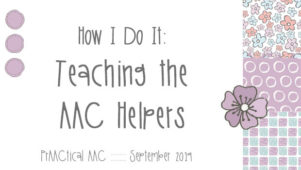
We welcome Amanda Samperi back to these pages with more ideas for prAACtical ways to address AAC implementation challenges. As an SLP, Amanda has served individuals with complex communication needs in school, home, and medical settings. She has presented on AAC-related topics st ASHA, an IEE Electrical Safety Workshop, and at the AAC in the Cloud Conference. Amanda hopes to continue sharing her knowledge and experiences about AAC through her blog, AAC is where it’s AT. Today, she shares some ideas for helping staff members better support AAC learners. :::::::::::::::::::::::::::::::::::::::::::::::::::::::::::::::::::::::::::::::::::::::::::::::::::::::::::::::::::::::::::: How I Do It: Teaching the Helpers Mr. Rogers had it right – you will always find people helping. Helpers make our world go round. We rely on them in times of tragedy, celebrate with them in times of joy, and lean on them in times of need. Helpers play a large role in both the home and school lives... [Read More...]









